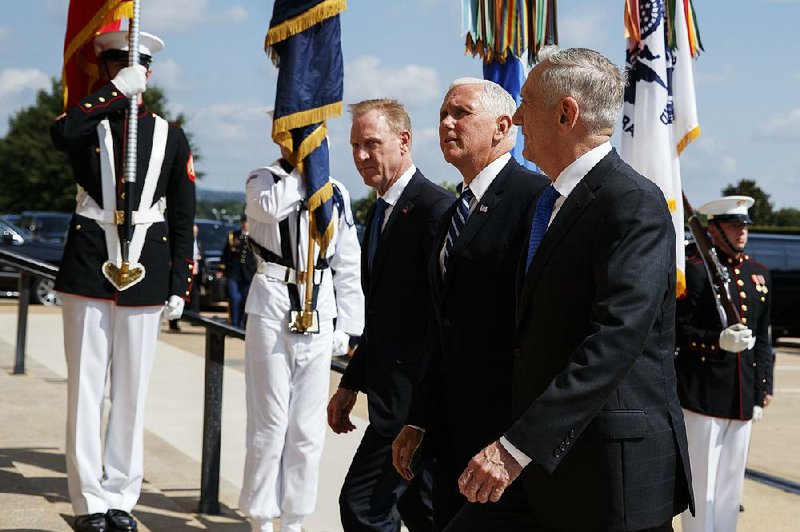WASHINGTON -- Pointing to growing threats and competition from Russia and China, the White House on Thursday announced ambitious plans to create the U.S. Space Force as a sixth, separate military war-fighting service by 2020.
The proposal taps into the American public's long fascination with space but with a military focus, and it faces daunting hurdles. It requires congressional approval and has been met with skepticism from military leaders and experts who question the wisdom of creating an expensive, bureaucratic new service branch.
Vice President Mike Pence announced the new force during a Pentagon speech, fleshing out an idea that President Donald Trump has flagged in recent months as he vowed to ensure American dominance in space. Pence described space as a domain that was once peaceful and uncontested but has now become crowded and adversarial.
"Now the time has come to write the next great chapter in the history of our armed forces, to prepare for the next battlefield where America's best and bravest will be called to deter and defeat a new generation of threats to our people, to our nation," said Pence.
Trump marked Pence's announcement with a tweet: "Space Force all the way!"
Pence portrayed the change as a response to foes' potential aggression rather than any offensive U.S. military effort.
Citing Russia and China, he said that for years U.S. adversaries have "pursued weapons to jam, blind and disable our navigation and communication satellites via electronic attacks from the ground."
"As their actions make clear, our adversaries have transformed space into a war-fighting domain already, and the United States will not shrink from this challenge," he said.
In June, the president directed the Pentagon to create a "separate but equal" space force, a complicated and expensive move that could take years to gain Congress' approval and become operational. On Thursday, Pence said the administration will work with Congress on the plan, and will outline a budget next year. The last time the U.S. created a new uniformed military service was in 1947, when the Air Force was organized after World War II. It joined the Army, Navy, Marine Corps and Coast Guard.
Defense Secretary James Mattis has endorsed steps to reorganize the military's space war-fighting forces and create a new command, but has previously opposed forming an expensive new service. A new branch of the military would require layers of bureaucracy, military and civilian leaders, uniforms, equipment and an expansive support structure.
Deborah James, who served as Air Force secretary for the final three years of President Barack Obama's administration, estimated it would be five to 10 years before a separate service would be fully formed.
The military's role in space has been under scrutiny because the United States is increasingly reliant on orbiting satellites that are difficult to protect. Satellites provide communications, navigation, intelligence and other services vital to the military and the national economy.
U.S. intelligence agencies reported earlier this year that Russia and China were pursuing "nondestructive and destructive" anti-satellite weapons for use during a future war. And there are growing worries about cyberattacks that could target satellite technology, potentially leaving troops in combat without electronic communications or navigation abilities.
The Pentagon proposal delivered to Congress on Thursday lays out plans to consolidate U.S. war-fighting space forces and make organizational changes to boost the acquisition and development of technologies.
It says the department will establish a Space Command to develop war-fighting operations, a Space Development Agency to more quickly identify and develop new technologies, a Space Operations Force of leaders and fighters and a new support structure. In the second phase the Pentagon would combine all the components into the new sixth branch of service.
Information for this article was contributed by Sagar Meghani and Dan Elliott of The Associated Press.
RELATED ARTICLE
http://www.arkansas…">Cotton's cautious of new space force
A Section on 08/10/2018
